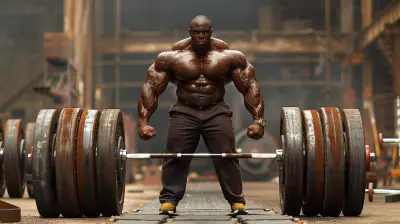How Sleep Improves Muscle Recovery After Exercise
5 July 2025
Let’s get real for a second—if you’re hitting the weights hard, crushing HIIT classes, or training for a marathon, you already know how important rest days are. But did you know your most powerful recovery tool might be something you’re doing every night (or at least should be)? Yep, we're talkin' about sleep.
Sleep isn't just "downtime." It’s prime-time for muscle recovery. It’s when your body goes into full-on repair mode, mending torn muscle fibers, balancing hormones, and recharging your brain batteries. So if you’ve been skipping sleep or treating it like an afterthought, it's time to rethink your recovery game.
Let’s dig into exactly how sleep improves muscle recovery after exercise—and why you should start prioritizing those Zzz’s like you do your protein shakes.
Why Muscle Recovery Matters
First thing’s first: Why should you even care about muscle recovery?Every time you work out—whether that's lifting, running, cycling, or even yoga—you create tiny microtears in your muscle fibers. It sounds scary, but it’s totally normal. Those microtears are what trigger your body to rebuild muscle stronger and more resilient than before. That’s where the “gainz” come from.
But here’s the catch: The rebuilding only happens during recovery. If you're not allowing your body to rest and repair, you're not building muscle—you're just breaking it down.
And this is where sleep comes in.
The Science of Sleep and Muscle Recovery
Let’s break it down a bit. Sleep isn't just a passive state of unconsciousness. It’s actually a highly active process where your body performs a number of essential repair functions. For athletes and fitness enthusiasts (aka you), these processes are crucial.1. Sleep and Human Growth Hormone (HGH)
You’ve probably heard of human growth hormone, or HGH. It's like a natural steroid your body produces to help grow and repair tissue—including muscle. The bulk of HGH is released during deep sleep, especially during the first sleep cycle (usually within the first couple hours of falling asleep).So, if you’re skimping on sleep, you’re literally cutting off your muscle-building potential. It's like showing up to the gym and not lifting the bar.
2. Protein Synthesis Happens While You Snooze
Muscle repair is all about protein synthesis. This is the process that rebuilds those microtears in your muscles with new, stronger protein strands. During sleep, your body ramps up this rebuilding process.Think of your body like a construction crew. During the day, you’re busy delivering raw materials (food, nutrients, weights), but at night—the crew gets to work. No sleep means no crew, and no crew means no repairs.
3. Reduced Inflammation and Cortisol Levels
Intense workouts can cause inflammation—again, totally normal. But chronic inflammation? That’s a recipe for injuries and burnout. Quality sleep helps reduce systemic inflammation, calming your body and allowing for faster healing.On the flip side, sleep deprivation spikes cortisol, the infamous stress hormone. High cortisol levels break down muscle tissue and suppress muscle growth. That's the exact opposite of what you want when trying to recover and build strength.
Stages of Sleep and Their Role in Muscle Recovery
Sleep isn't just one long, boring state. It’s made up of different stages, each playing a unique role in your recovery process.Stage 1 & 2: Light Sleep
This is the "dozing off" zone. Your body starts to relax, your heart rate slows down, and your temperature drops. Not much recovery happens here, but it's crucial to transition into deeper stages.Stage 3: Deep Sleep (Slow-Wave Sleep)
This is where the magic happens. Deep sleep is when your body releases HGH, repairs tissues, and strengthens the immune system. It’s like your muscle cells are clocking in for the night shift.If you’re not spending enough time in deep sleep, you’re missing out on the best part of muscle recovery.
REM Sleep
REM (Rapid Eye Movement) sleep is mainly for your brain, but it's still important. This is when your mind processes everything you've learned physically and mentally. So if you’re learning new movements or trying to improve form, REM helps commit those motor skills to memory.
How Poor Sleep Hurts Muscle Recovery
Okay, so what happens if you're not sleeping well?- Delayed Muscle Repair – Without sufficient deep sleep, your body struggles to repair muscle tissue efficiently.
- Decreased Performance – Poor sleep equals less energy, slower reaction times, and weaker muscles.
- Increased Injury Risk – Lack of sleep affects coordination and focus, making you more prone to injuries.
- Stalled Progress – Without proper recovery, you’ll plateau, or worse, regress in strength and endurance.
Basically, if you’re not sleeping, you’re not recovering. And if you’re not recovering, you’re not progressing. Simple as that.
How Much Sleep Do You Really Need?
This is the golden question. For the average adult, 7–9 hours of sleep per night is the sweet spot. But if you’re training hard or you're an athlete, you might need even more—sometimes up to 10 hours to fully recover.Pay attention to your body: Are you constantly sore, sluggish, or having trouble focusing in the gym? That might be your body asking for more rest.
Tips to Improve Sleep for Better Muscle Recovery
We all know sleep is important, but actually getting quality rest is sometimes easier said than done. Here's how you can level up your sleep game:1. Stick to a Consistent Sleep Schedule
Your body loves routine. Go to bed and wake up at the same time every day—even on weekends. Consistency helps regulate your internal clock and improves sleep quality.2. Create a Sleep-Friendly Environment
Your bedroom should be your recovery sanctuary. Keep it cool, dark, and quiet. Invest in blackout curtains, noise machines, or a comfy mattress if needed.3. Limit Blue Light Before Bed
Phones, tablets, laptops—they all emit blue light that messes with melatonin production. Try shutting them down 1–2 hours before bed.4. Fuel Your Body Right
Avoid heavy meals, caffeine, or alcohol too close to bedtime. Instead, a small protein-rich snack (like Greek yogurt) might actually help with overnight muscle repair.5. Stretch and Wind Down
Doing some light stretching or deep breathing before bed helps signal your body that it's time to recover and relax. It's a great way to transition out of “go mode” into “rest mode.”The Connection Between Sleep and Athletic Performance
Here’s the kicker—better sleep doesn’t just help with muscle recovery, it boosts athletic performance too. Research shows that athletes who sleep more have improved speed, accuracy, and reaction time.Tom Brady sleeps 9 hours a night. LeBron James? Around 12 hours. They’re not lazy—they’re smart.
Even if you’re not a pro athlete, better sleep translates to stronger lifts, faster runs, and quicker recovery between sessions. And hey, who doesn’t want that?
Sleep Supplements: Yay or Nay?
If you’re struggling with sleep, you might be tempted to reach for a supplement. Melatonin, magnesium, or valerian root are a few commonly used options.But here’s the deal: Supplements should be a last resort, not your first move.
Start by adjusting your habits and environment first. If you still struggle after cleaning up your sleep hygiene, then chat with a healthcare provider before popping anything new.
Final Thoughts
So, what’s the takeaway? Sleep isn’t just “nice to have”—it’s vital for muscle recovery and athletic progress. If you’re serious about getting stronger, faster, and healthier, it's time to treat sleep like part of your training plan.Think of each night’s sleep as a recovery session for your body and brain. Skip it, and you're short-changing all the hard work you put in at the gym. Embrace it, and you'll unlock gains you didn’t think were possible.
So tonight, instead of just setting an early alarm for your workout, set a bedtime alarm too. Your muscles will thank you.
all images in this post were generated using AI tools
Category:
Sleep HealthAuthor:

Laura Hudson
Discussion
rate this article
2 comments
Edith McGehee
Sleep: the underrated superhero of muscle recovery! While we hustle through workouts, it’s during those precious hours of shut-eye that our muscles repair and grow stronger. Prioritize quality sleep, and you won’t just wake up; you'll wake up stronger. Ready to conquer that next workout!
January 27, 2026 at 4:01 AM

Laura Hudson
Absolutely! Quality sleep is essential for muscle recovery and growth. Prioritizing it can significantly enhance your workout performance and overall strength.
Wyatt Mendoza
Thank you for this insightful article on the connection between sleep and muscle recovery. It's fascinating how prioritizing rest can enhance our performance and overall health. I appreciate the tips provided and will definitely incorporate better sleep habits into my routine to support my fitness goals. Keep up the great work!
July 14, 2025 at 3:08 AM

Laura Hudson
Thank you for your kind words! I'm glad you found the article helpful and wish you the best on your journey to better sleep and recovery. Keep up the great work!


